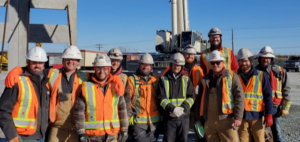Iron Maple focuses on young workers, involving staff in safe work plans

When Iron Maple Constructors was formed in May 2020, the ownership group made it clear right out of the gate that safety was of the utmost importance.
“Their belief is that production does not take precedence over safety,” said Earl Affleck, safety manager at the Dartmouth, NS-based general contractor. “If you need something, they get it for you. The safety culture has been passed down from the top.”
The company has a training matrix for site management and supervisors that includes a variety of courses, including WHMIS, basic first aid, leadership for safety excellence, accident and incident investigation, principles of loss control, hazard identification and control, JOHSC member/representative, fall protection and mobile elevated work platform/telehandler training. The majority of the courses except for mobile elevated work platform are taken at Construction Safety Nova Scotia. (Sneak peek: A mobile elevated work platform training course is set to launch later in 2023!)
“Our belief is if they don’t have that training, it’s hard to see whether someone is doing it right,” said Affleck.
Tilt-up work
One of the biggest hazard Iron Maple faces is likely the tilt-up work. The company, which has 140 employees, has a separate safety manual for this work, and it conducts a safety standdown to review the procedures with staff and the crane operator every time this work is conducted. The field-level hazard assessments are a valuable asset because if anything changes, it allows the workers to discuss it and make sure they feel prepared.
“It’s a high risk, and we need to make sure everyone understands their role because these panels could be 20 tons, and if something happens, it could be catastrophic,” said Affleck.
In addition to ensuring the work area is properly marked, workers are trained on proper ergonomics to ensure they are not bending or twisting, and they often conduct stretches before the work begins.
Involving staff
Affleck has about 50 topics for toolbox talks on the “resources” page of Site Docs that supervisors can pull from, and they are expected to choose topics relevant to the work or conditions at hand — heat stress in August, for example. They often give Affleck feedback if there is a new topic they would like to have available.
Affleck also makes sure to involve staff when developing safe work plans. He writes a draft then sends it around to workers who make their comments and suggestions, which Affleck incorporates into the final versions.
“The workers tell me what they want in it,” said Affleck. “They are very involved and they tell me step by step how they are doing it. We really can’t do it without their involvement.”
Recently, Iron Maple changed the name of its near miss program to “good catch, near miss” to encourage workers to report good catches — and it worked! The number of reports received has increased now that workers have switched their mindset.
“When it’s a good catch, it’s not a negative thing. A lot of people think with near misses that something did happen, but we try to catch it before it does,” said Affleck.
Young workers
Iron Maple is very committed to young worker safety and has many employees under the age of 30 in roles ranging from project coordinators to carpenters. The company believes in growing talent from within.
“Many of our superintendents started out as carpenters on the job site we believe in providing the atmosphere and training to allow our entry level employees to grow,” said Affleck. “They are the future; they will be the leaders of tomorrow.”
Iron Maple is the winner of the CSNS 2023 Young Worker Safety Award. Apprentices and new hires undergo a wide range of comprehensive training and new employees are placed with a more experienced mentor in the trades.
COR® certification
Iron Maple is COR® certified, which is important to the company because it is a nationally recognized standard. Iron Maple operates in Nova Scotia and New Brunswick, so having one consistent standard makes it much easier.
“COR® sets the standard for our clients. Not all clients require it, but the majority do,” said Affleck. “When people see that you are COR® certified they realize that you are committed to safety.”
Return to work
At CSNS, we are working with industry, the WCB, and other stakeholders to find ways to improve the return to work system for Nova Scotia construction workers and employers. This topic is near and dear to Affleck’s heart as he was an injured worker himself nearly 30 years ago before he got into the safety profession.
“Lumber fell on top of me and I was off work for six months. I had surgery on his back and leg. I am lucky to be here to tell you the truth,” Affleck said. “I know the value of getting people back to work safely.”
One of the hardest things about being off work due to an injury is you don’t feel part of the team anymore, he said, you lose that social connecting with your colleagues and it’s important to try and get your life back to normal as soon as possible — but safely of course.
At the company’s New Brunswick site, an individual has been off work due to an injury but after six weeks, they were able to return slowly, starting with just three days per week for four hours each day. Everything is done in consultation with their occupational therapist and their supervisor is very accommodating — whenever they need a break, they take it. Even though the worker was only off for three weeks, they were given a complete re-orientation of the site when they came back, and they walked through the work with their supervisor to determine what they could and could not do.
“In the old days, you came back to work or you didn’t get back. But now with early return to work, it allows someone to know I don’t need to work the full eight hours per day to go back,” Affleck said. “The key is to gradually get people back in a safe manner.”







